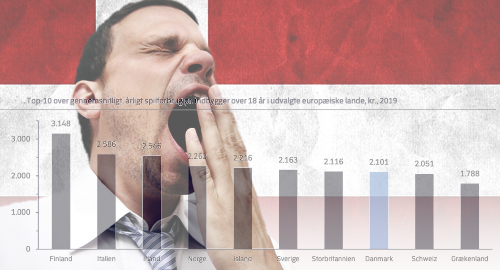 Denmark’s gamblers spend far less than gamblers in neighboring Nordic countries and put far greater emphasis on sports betting than other gambling options.
Denmark’s gamblers spend far less than gamblers in neighboring Nordic countries and put far greater emphasis on sports betting than other gambling options.
On Tuesday, Denmark’s Spillemyndigheden regulatory agency released the results of a new survey of gambling activity across 10 European markets. The survey, which relied on 2019 data provided by H2 Gambling Capital, compared Europe’s top-10 per-capita gambling spending markets.
The survey ranked Denmark eighth among these 10 countries with per-capita gambling spending of DKK2,101 (US$341) for residents aged 18 years or older. Only Germany (DKK2,051) and Greece (DKK1,788) ranked lower.
At the other end of the spectrum, Finland topped the chart with DKK3,148, well out in front of runner-up Italy (DKK2,586) and third-place finisher Ireland (DKK2,546). Denmark also scored lower than Nordic neighbors Norway (DKK2,262), Iceland (DKK2,216) and Sweden (DKK2,163), while narrowly edging out the UK (DKK2,116).
Danes were also more likely to devote less of their gambling spending on products preferred by their European counterparts. Danes spent around 42% of their gambling budget on casinos and 33% on lotteries, below the continental averages of 45% and 38%, respectively.
By contrast, Danes spent 26% of their gambling budget on sports betting, well ahead of the 17% average in other European markets. Spillemyndigheden noted that some of these markets (Finland, Norway) are still clinging to the old state-run gambling monopoly model and thus their sports betting offering may simply be “much less attractive” to local gamblers.
Comparing apples to apples, Spillemyndigheden’s figures for the Danish gambling market in 2019 show sports betting (land-based and online) holding a slight edge over the online casino vertical, while Denmark’s few land-based casinos managed revenue of only around one-quarter that of slots halls.
The sports betting and online casino verticals effectively tied on Q3 2020’s revenue chart, with both products suffering negative annual growth. Slots halls reported flat revenue while land-based casinos rose 6% as Danes apparently shook off their pandemic hibernation and embraced a well-deserved night on the town.